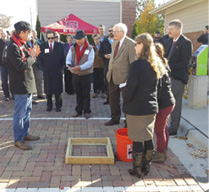Sixty Interlocking Concrete Pavement Institute members, local design professionals and government officials—led by U.S. Representative David Price (D-NC)— participated in a late-2017 North Carolina State University demonstration of how permeable interlocking concrete pavement (PICP) can help mitigate stormwater runoff peaks and reduce flooding.
“For people in our state, particularly in this part where we have been growing so much, the words permeable and impermeable have been in our vocabulary for quite some time,” said Rep. Price, a House Appropriations Committee member and ranking Transportation, Housing and Urban Development Appropriations Committee member. “We think of them every storm, particularly in my case when I look out my door and see the creek swelling and know that it has to do with the impermeable pavement upstream and the way development has proceeded for many, many years.
|
|
| Staged at The Greens on N.C. State’s Centennial Campus in Raleigh, the demonstration was led by Fred Adams Paving and Department of Biological and Agricultural Engineering Professor Dr. Bill Hunt. |
“There is a need for a better way. Not only to mitigate damage from a particular storm, but also to build to better standards to mitigate damage in the future. [Permeable pavement] is part of a bigger picture that has to do with everything from the way we pave, to the way we construct housing, to where we put our wetlands and parks.”
“PICP has shown significant runoff and pollutant reduction for walkways, plazas, driveways, parking lots, alleys, and streets throughout the U.S.,” added ICPI Chairman Matt Lynch (Oldcastle Architectural). “We are pleased that Congressman Price is examining how PICP can help achieve national policy imperatives.”
In government affairs and promotion activities, ICPI presents PICP as a durable, cost-effective solution for compliance with national, state/provincial and municipal stormwater regulations. The surface consists of solid, durable concrete pavers with small, stone-filled joints that allow water to flow into highly permeable, open-graded bedding, base, and subbase aggregates. The spaces among the aggregates store water and enable infiltration into the soil subgrade rather than generating surface runoff.
ICPI notes that PICP can provide the best of all worlds: facilitate robust construction, economic development and jobs, but in a way that will reduce flooding and improve water quality by not adding to stormwater runoff volume. PICP is recognized as an Environmental Protection Agency Best Management Practice for stormwater mitigation, a means for creating low-impact development and meeting growing construction mandates to build without adding to flooding.
